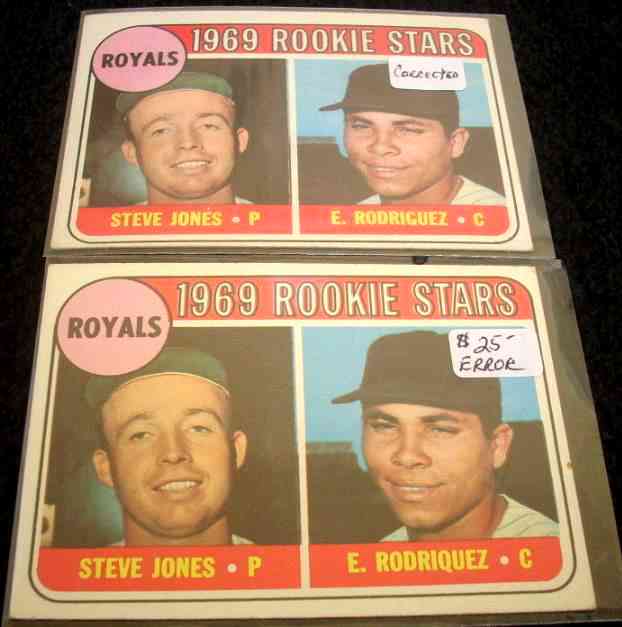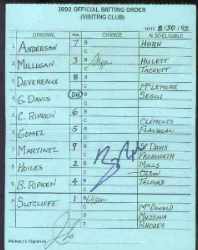1969 Topps # 49BA Royals Rookies BOTH VARIATIONS 'RodriGuez/RodriQuez'
With Steve Jones/Eliseo Rodriguez.

Please wander around the website for more info, prices, values & images
on vintage baseball, football, basketball, hockey, sport and non-sports cards.
Team Autographed / Signed Baseballs
Team signed baseballs were the thing well before single-signed
balls exploded on the market.
Click for our current
Autographed/Signed Team Baseball inventory
What is a "Team Signed Baseball" ??? Simple answer: A ball with XXX signatures of a certain team for a certain year. What is difficult is the XXX. Baseball tons of roster moves make it nearly impossible to "Get Them All". Generally, team signed baseballs from early 1900's had 10 to 15 signatures, the 1940's that jumped to 18 to 25. Joyce Sports Research Collection (Notre Dame) says "signatures must include only members of a specific team from a specific year, and there must be some approximation of completeness." Not concrete but to me a "team ball" MUST have ALL the team's STARS (unless a rookie or in season trade) and in today's market at least 20, preferably more, and the manager.
Determining Age of Team Signed Balls
Note: You may be on that page now. |

1951 Bowman Football Cards |

Authentic Major League SIGNED |

Grade/Condition Centering, corner wear, photo clarity, edges, creases, print flaws ... all combine to determine a card's condition or grade. Along with rarity/scarcity it is the major factor in a card's value.
Graded Card As values increased the condition of cards and the determination of fakes and alterations became increasingly more important. Various companies became "graders" of your cards. For a fee they would grade your card (usually on a 1 to 10 scale) and then placed in a sealed plastic holder with labelling of the vital information.
From past experiences, most people are NOT HAPPY with the grades they receive. To keep values up, graders can be extremely picky. Things you don't see, they do so don't be surprized when the NEAR MINT card you send in ends up with an EX or EX/MINT grade.
There are TOO many grading companies - if you do, do choose carefully. PSA / SGC / GAI / BGS are some of the many companies. It is good to know that getting a card graded by a company that people do not recognize or respect will usually just cost you time and money and not help you in any way.
 These are the official lineup cards SIGNED BY THE MANAGER & given
to the home plate umpire before the game with the team's line-up
& batting order !!! Making them even neater, often managers made
lineup changes on these cards throughout the game.
These official lineup cards were SIGNED BY THE MANAGER and presented
to the home plate umpire before the game. They detailed the team's lineup and
batting order. Managers often made lineup changes on these cards throughout
the game, making them even more unique.
These are the official lineup cards SIGNED BY THE MANAGER & given
to the home plate umpire before the game with the team's line-up
& batting order !!! Making them even neater, often managers made
lineup changes on these cards throughout the game.
These official lineup cards were SIGNED BY THE MANAGER and presented
to the home plate umpire before the game. They detailed the team's lineup and
batting order. Managers often made lineup changes on these cards throughout
the game, making them even more unique.
